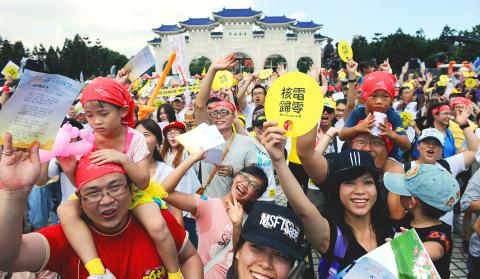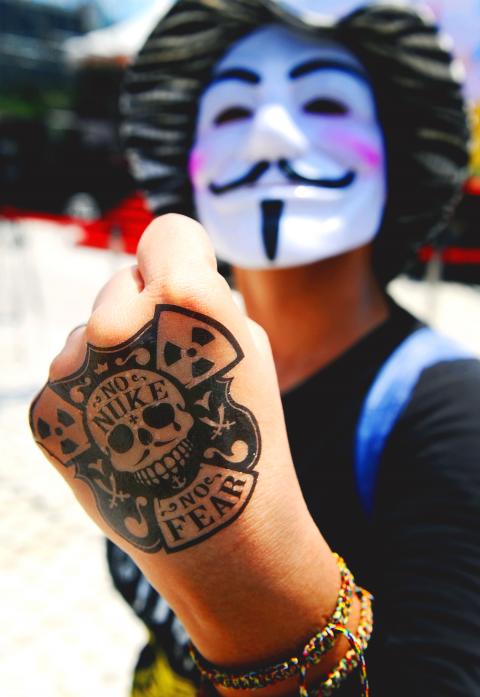“Who covered up the rainbow in the children’s sky?” more than a thousand people sang at the Chiang Kai-shek Memorial Hall Plaza in Taipei yesterday morning during an event organized by Mom Loves Taiwan, an association of mothers opposed to nuclear power, and nine civic anti-nuclear groups, to make a music video for an anti-nuclear song.
Mom Loves Taiwan founder Irene Chen (陳藹玲) said her group is calling on the government to find a viable nuclear waste treatment method as soon as possible, to implement energy and environmental education, and to fix a schedule and enforcement rules for achieving a nuclear-free homeland.
Writer-turned-TV host Kevin Tsai (蔡康永) said that in addition to the possible risks of a radiation leak, what worries him most is the spent nuclear fuel that the government has not yet found a way to deal with.

Photo: Lo Pei-der, Taipei Times
“It’s like handing medicine to a mother to give to her children, but telling her that its side effects can cause cancer … if we cannot deal with nuclear waste, then we cannot use nuclear power just because we want to power our air conditioners, and allow dangerous spent nuclear fuel to be stored close to where we live,” he said.
“The logic should be — if we cannot deal with nuclear waste, then we have no right to use nuclear power,” he said, adding that “once the land is contaminated [by nuclear radiation], we leave an uninhabitable ghost island to our children, so we must remind decisionmakers to stop an irreversible mistake before it is to late.”
A woman surnamed Kuo (郭), who brought her three-year-old twin sons to the event, said that after Japan’s Fukushima Dai-ichi nuclear disaster, she started to think about “the kind of environment we want to leave for our children.”

Photo: Lo Pei-der, Taipei Times
“The future belongs to our children, so I want them to understand the danger of nuclear power and that the Earth needs to be protected as early as possible,” added a man surnamed Hung (洪), who brought his four-year-old and two-year-old daughters to take part in the event.
“I think the information we get from the government is always biased, so we should gain more information about the issue from the Internet or events such as this one,” he said. “I want to know whether nuclear power is necessary, and whether nuclear power is the only option or the worst option.”
Masaka Uemae, a Japanese woman from Fukushima who brought her daughter with her to Taiwan after the disaster, said that although the Japanese government suggested an evacuation zone of 30km around the damaged plant, media reports have shown high levels of nuclear radiation even at 60km from the plant and that recently 43 children from Fukushima Prefecture were suspected to have developed thyroid cancer.
At the sing-along yesterday, organizers handed out brochures on how to save electricity, such as boiling drinking water and keeping it in thermos bottles instead of keeping the hot water dispenser on all day, efforts the anti-nuclear activists said could reduce electricity consumption by 6 percent — approximately the percentage of electricity supply the Fourth Nuclear Power Plant is expected to provide.

SECURITY: As China is ‘reshaping’ Hong Kong’s population, Taiwan must raise the eligibility threshold for applications from Hong Kongers, Chiu Chui-cheng said When Hong Kong and Macau citizens apply for residency in Taiwan, it would be under a new category that includes a “national security observation period,” Mainland Affairs Council (MAC) Minister Chiu Chui-cheng (邱垂正) said yesterday. President William Lai (賴清德) on March 13 announced 17 strategies to counter China’s aggression toward Taiwan, including incorporating national security considerations into the review process for residency applications from Hong Kong and Macau citizens. The situation in Hong Kong is constantly changing, Chiu said to media yesterday on the sidelines of the Taipei Technology Run hosted by the Taipei Neihu Technology Park Development Association. With

CARROT AND STICK: While unrelenting in its military threats, China attracted nearly 40,000 Taiwanese to over 400 business events last year Nearly 40,000 Taiwanese last year joined industry events in China, such as conferences and trade fairs, supported by the Chinese government, a study showed yesterday, as Beijing ramps up a charm offensive toward Taipei alongside military pressure. China has long taken a carrot-and-stick approach to Taiwan, threatening it with the prospect of military action while reaching out to those it believes are amenable to Beijing’s point of view. Taiwanese security officials are wary of what they see as Beijing’s influence campaigns to sway public opinion after Taipei and Beijing gradually resumed travel links halted by the COVID-19 pandemic, but the scale of

A US Marine Corps regiment equipped with Naval Strike Missiles (NSM) is set to participate in the upcoming Balikatan 25 exercise in the Luzon Strait, marking the system’s first-ever deployment in the Philippines. US and Philippine officials have separately confirmed that the Navy Marine Expeditionary Ship Interdiction System (NMESIS) — the mobile launch platform for the Naval Strike Missile — would take part in the joint exercise. The missiles are being deployed to “a strategic first island chain chokepoint” in the waters between Taiwan proper and the Philippines, US-based Naval News reported. “The Luzon Strait and Bashi Channel represent a critical access

Pope Francis is be laid to rest on Saturday after lying in state for three days in St Peter’s Basilica, where the faithful are expected to flock to pay their respects to history’s first Latin American pontiff. The cardinals met yesterday in the Vatican’s synod hall to chart the next steps before a conclave begins to choose Francis’ successor, as condolences poured in from around the world. According to current norms, the conclave must begin between May 5 and 10. The cardinals set the funeral for Saturday at 10am in St Peter’s Square, to be celebrated by the dean of the College